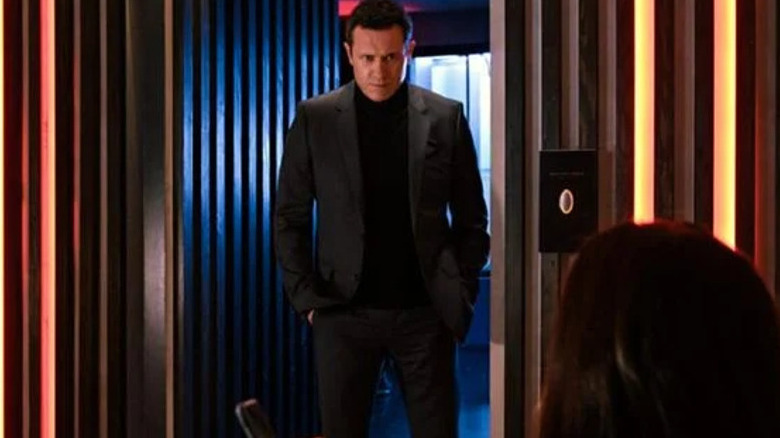Hypnotic Ending Explained: When Fear Becomes A Weapon
Hypnosis is a double-edged sword in Netflix's psychological thriller, "Hypnotic," which navigates how even the best of human inventions can be disrupted by virtue of nefarious intentions. Directors Matt Angel and Suzanne Coote attempt to imbue this oft-rehashed trope with meaning, but ultimately fail to craft a cohesive narrative that manages to keep viewers on edge. Nevertheless, there is some merit to the ending of "Hypnotic," as it incorporates a well-executed identity twist and a frenetic chase sequence that is both hallucinatory and crystal clear for some reason, at the same time.
The sole axis that saves "Hypnotic" from crumbling utterly apart is Kate Siegel's Jenn, a software engineer undergoing an acute psychological crisis after a series of personal tragedies. While Seigel's performance as Jenn lacks the visceral brilliance of her portrayal of Madison in Mike Flanagan's "Hush," she invests the character with the right amount of pathos and humor right up till the end.
"Hypnotic" is the kind of film which attempts to introduce too many threads, red herrings, and hackneyed genre tropes — some of which work violently against its favor — but still manages to pose interesting questions about the human psyche. Are our fears linked so close to our desires, and if so, can even the most deep-seated caverns of the mind be violated by those who have a crude understanding of base emotions? Dr. Meade (Jason O'Mara) emerges as such an individual, professionally capable of complex feats while being absolutely incapable of parsing core psychology on a humane level. Here's a deep dive into his possible motivations in the context of the film's ending.
When fear becomes a weapon
"Hypnotic" introduces Jenn's first hypnosis session with Dr. Mead as a simple, gentle immersion into the subconscious, which has its purported results that help Jenn cope with her existential ennui. An element of stability crystallizes in Jenn's life, as she is able to land a job befitting her talents and handle her emotions with nuance. This, of course, is meant to highlight the benefits of hypnotherapy when used by therapists to help individuals regain control over their life, allowing them to master everyday fears to a considerable extent. Dr. Mead, however, is no upstanding therapist — having been coached by CIA-backed scientist who participated in Project MK Ultra, Dr. Xavier Sullivan — and his actions are solely dictated by a twisted sense of recreating a living puppet of his deceased wife.
Meade's intentions take form when Kate has no memory of calling her ex-partner Brian (Jaime M. Callica) to dinner, during which, he has a fatal allergic reaction that lands him in a coma. This string of events was orchestrated by Meade with the aid of a trigger phrase, a common method used by hypnotherapists to usher a certain state of mind in patients. In her conscious state, Jenn would never knowingly trigger Brian's nut allergy, (as evidenced by her endearing concern for him in the opening scene,) hence Meade's machinations that drive her to almost kill the man she loves, paints him as downright dangerous and unhinged.
The revelations toward the end help reveal a pattern in Meade's methodology: he targets deep-seated fears in his patients by planting trigger words during the hypnosis sessions and activates them to further his own ends. As a result, at least three women end up dead, including Jenn's close friend, Gina.
A killer's idea of perfection
Much of "Hypnotic" is driven by Meade's twisted idea of "perfection," at least in the way in which he compares his victims to that of his deceased wife, Amy. Instead of adopting a healthy method of channeling his grief — as he should have, considering he is a trained therapist — he decides to hunt down women resembling Amy and gradually substitute their memories with hers via the power of hypnotic suggestion. Some of his patients, including Andrea Bowen, were unable to match up to Meade's image of a "perfect" partner, which prompted him to kill them off via a trigger phrase that led to fatal accidents or cardiac arrest. Detective Rollins (Dulé Hill) experiences Meade's abject cruelty firsthand when he is attacked by one of his patients, who attempts to carry out the deed unbeknownst to her conscious self.
After Jenn is lured to Xavier Sullivan's house via the flashes of her implanted memories, Rollins realizes she is in danger and arrives without backup (a rather baffling choice.) A fistfight ensues, with a severely hypnotized Jenn attempting to take back her autonomy by fighting off Meade's trigger commands. The crux of the ending twist lies in the idea of a counter trigger: Dr. Stella Graham had placed a counter-phrase in Jenn's subconscious, which would snap her back to reality when uttered during Meade's fabricated manipulations. This, for some reason, works, allowing Jenn to shoot Meade for good and free herself from the cycle of trauma.
This snatching back of her sense of self, or autarkia, acts as a healing agent for Jenn, allowing her to get her life back on track, and the film ends on a note of hope and a new beginning. One can only hope she never receives hypnotherapy again — at least not in the way that leads to a loss of identity and potentially being murdered.


